Strikes in Spain
Strikes in Spain: Travel Implications, Avoiding Disruptions, and Planning Ahead
Strikes are an inherent part of labor disputes, changes in government policy, and social or economic movements throughout the world. While some countries have a relatively stable labor environment, others like Spain face frequent strikes owing to a number of factors such as a high unemployment rate, social unrest, and economic turmoil. Strikes in Spain are not rare occurrences and can often cause disruptions to various services, especially public transportation, affecting both locals and tourists alike. In this article, we delve deeper into the phenomenon of strikes in Spain, exploring how they affect travel, tips on avoiding disruptions, and planning ahead.
Background of Strikes in Spain
Spain has always had an unstable labor environment with strikes dating back to the 19th century following the rise of labor unions. Over the years, strikes have been motivated by a variety of issues including job security, fair wages, and changes in employment law. Regional tensions such as those between Catalonia and the rest of Spain have also contributed to strikes in the past. However, the recent economic turmoil that began with the 2008 financial crisis saw an increase in public demonstrations and strikes.
The economic crisis took a heavy toll on Spain’s economy, leading the government to impose austerity measures, slashing public spending, and increasing taxes. Consequently, the impact was felt by various sectors as many experienced job losses, pay cuts, and a rise in poverty levels. This resulted in widespread dissatisfaction with the government’s policies and provoked numerous strikes ranging from nationwide general strikes to localized sector-based protests.
Effects of Strikes on Travel in Spain
When planning a trip to Spain, it is essential to be aware of the possibility of travel disruptions caused by strikes. The most common sector affected by strikes is usually public transportation. Rail and metro workers, bus drivers, and air traffic controllers often participate in strikes, leading to disruptions in train, bus, and flight services. In addition to public transportation, other industries such as hospitality, tourism, and even education have experienced strikes in the past. Strikes not only inconvenience travelers but also lead to economic losses for businesses and the overall economy.
During a strike, public transportation services may operate at reduced capacity or halt services altogether. Trains and metros are likely to be delayed, with some routes canceled or significantly affected. Buses too may experience delays and cancellations, causing disruptions for those relying on public transport to explore Spanish cities. In the case of airport strikes, flights may be delayed, canceled, or rerouted, creating chaos for passengers and a logistical nightmare for airlines.
Apart from public transportation, strikes can also lead to the closure of popular tourist sites, museums, and other attractions. Additionally, hospitality workers going on strike can disrupt the operations of hotels, restaurants, and bars. It is worth noting that strikes in Spain can last anywhere from a few hours to several days, so predicting the duration of these events is not always feasible.
Avoiding Disruptions and Planning Ahead
The unpredictable nature of strikes in Spain means that travelers must be prepared to minimize the impact of disruptions and ensure a smooth journey. Here are some tips on how to deal with strikes in Spain:
- Stay informed: Keeping up-to-date with the latest strike news is paramount. Spaniards typically have a legal requirement to announce a strike in advance, so there is usually time to prepare. You can find strike information on the websites of the local transportation companies, news outlets, or social media platforms.
- Create a flexible schedule: When planning your trip, try to have some flexibility in your itinerary, so it is easier to adjust if necessary. If you plan to visit a museum or attraction on a particular day and there is a strike, having alternative options is beneficial.
- Use alternative transportation: If public transportation fails to operate efficiently during strikes, consider alternate means such as taxis, car rentals or rideshare apps like Uber. Keep in mind that these options are likely to be in high demand during strikes, so factor in the possible waiting times and costs.
- Purchase travel insurance: In case of severe disruptions that affect your travel plans, such as a flight cancellation, having travel insurance can provide financial protection and peace of mind.
- Learn some Spanish: Should you find yourself stuck in a strike, the ability to communicate with locals can be helpful. Spanish phrases, such as "¿Cuándo terminará la huelga?" (When will the strike end?), can be useful when seeking information.
- Opt for private tours: During your travel planning process, consider booking private tours that often have more flexibility with schedules and can adapt to any unforeseen strike related disruptions.
In conclusion, strikes in Spain are a part of life that travelers cannot ignore. Although they can cause inconveniences and disruptions, keeping informed, planning ahead, and being flexible will help minimize the impact on your travel plans. It is recommended to stay updated on the latest strike announcements and be proactive in creating alternative plans to make the most of your trip to Spain.
Barcelona FGC Strike Called Off for MWC Week

Barcelona FGC Rail Strike Disrupts Trains Feb 24-25

Barcelona Metro Strike Claim For Feb 22 and 24, 2026

Bharat Bandh India Transport Disruption Feb 12, 2026

Spain Rail Strike Recovery Leaves Trains Uneven Feb 10

Spain Rail Strike Called Off, Feb 9 to 11 Train Plans

Barcelona Rodalies Rail Disruption Before Feb 11 Strike

Spain Rail Strike Feb 9 to 11, Renfe AVE Tips

Western Europe Strike Spillover Risk For Airport Transfers

Spain Rail Strike Feb 9 to 11 Hits Trains Nationwide

Spain SEMAF Rail Strike Feb 9 to 11 Train Disruption

Spain Rail Strike Risk After Adamuz, Barcelona Crashes

A Coruña Bus Strike Disrupts Airport Buses Jan 23

Bilbao Airport Cleaning Strike Hits Terminals Jan 14-15

Madrid Barajas Ground Handling Strike Delays Jan 2, 2026
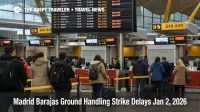
Handling Strike Madrid Barajas Airport, Dec 30 Jan 7

Spain Azul Handling Strikes Delay Baggage at Airports
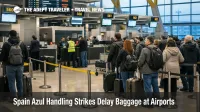
Madrid Airport Strike Dates, Barajas Dec 26 to Jan 7
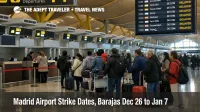
Azul Handling Strike Spain Airports Through Dec 31

Spain Airport Handling Strike Days Through December 31
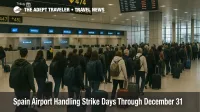
Ground Handling Walkouts Hit Spain Airports Through Dec 31
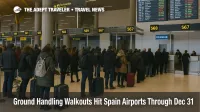
Spain Doctors Strike Cuts Hospital Care Dec 9 12

Spain Iryo Rail Strike To Hit Madrid Routes Dec 5 8

Spain Baggage Strikes Slow Airport Hubs For Ryanair

Spain High Speed Rail Strike Cuts Iryo Services

